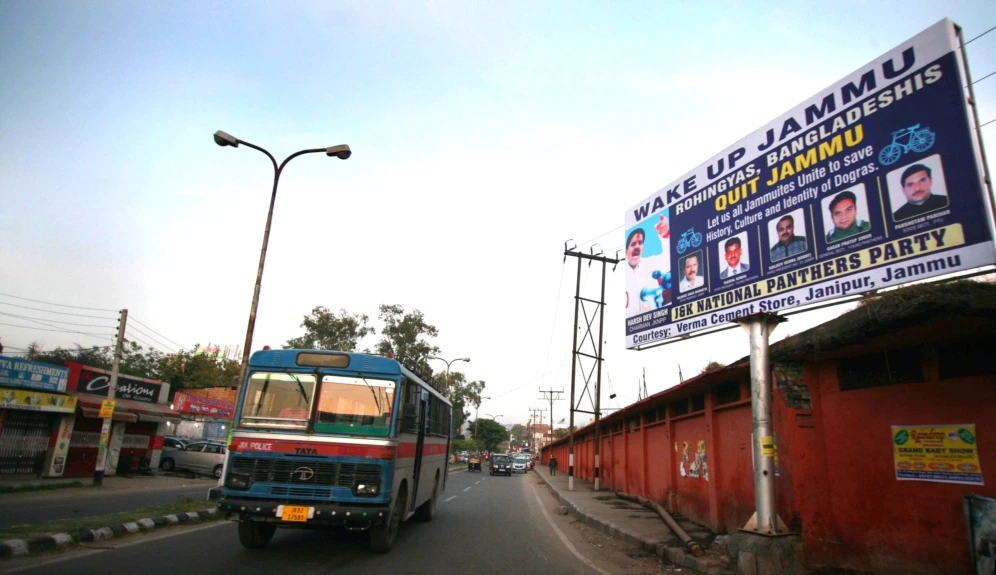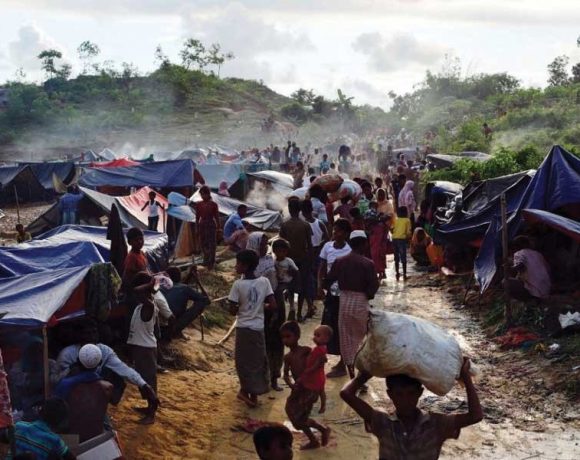India crackdown forces Rohingya refugees to go underground, flee to Bangladesh

NEWS DESK
The detention of dozens of Rohingya refugees in the north Indian city of Jammu, a north Indian union territory of Jammu and Kashmir, and the deportation of the two refugees to Myanmar has triggered panic among India’s Rohingya refugee community, VOA reports.
In the past month, 2,000 to 3,000 Rohingya refugees have fled from Jammu, fearing that they could be jailed and deported to Myanmar, according to advocacy groups. Many refugees have crossed over to Bangladesh, while others have gone underground in different parts of India.
Noor Mohammad is a Rohingya refugee who had lived in Jammu since 2012. He crossed over to Bangladesh with his wife and three children at the end of May. “In Kashmir, the police are arresting the Rohingya at random and throwing them in jail,” Mohammad told VOA.
He said even refugees holding U.N.-issued cards are not spared. “Every Rohingya is extremely scared of being sent back to Myanmar.”
Mohammad said he fled Jammu along with five other Rohingya families in May. However, he said there has been a rise in the number of refugees crossing over to Bangladesh from India with more than 1,000 refugees in the past few weeks headed to Cox’s Bazar.
To address the increasing number of refugees crossing from India to Bangladesh, Bangladesh’s Home Minister Asaduzzaman Khan Kamal said they have “informed the Indian government about the development,” and that they have given directions for the border guards to “push them [refugees] back to India.”
An official from the Indian home ministry in New Delhi that handles issues related to refugees refused to comment on the latest crackdown on Rohingya refugees in India.
Despite many attempts VOA failed to get a response on the ongoing crackdown on the Rohingya. Police officials in Jammu did not respond to related queries from the VOA during the time of publication.
‘Illegal immigrants’
For decades, minority Rohingya Muslims have fled to neighboring Bangladesh and other countries, including India, to escape discrimination and violence from Buddhist majority Myanmar. Three years ago, rights groups estimated that 40,000 Rohingya refugees lived in different parts of India.
In 2017, in Jammu, the Bharatiya Janata Party and other Hindu group leaders launched a campaign demanding all Rohingya be expelled from the area. The BJP-led Indian government subsequently ordered every state to identify and detain all Rohingya Muslim refugees and deport them to Myanmar.
Having not signed the 1951 U.N. Refugee Convention, Indian law regards all Rohingya refugees entering India as “illegal immigrants.”
Currently around 1,000 Rohingya are imprisoned in different parts of the country after being charged with illegal entry into India. A few dozen of them also have been deported to Myanmar in the past four years.
The crackdown on Rohingya refugees began days after U.S. Secretary of State Antony Blinken determined on March 21 that members of the Burmese military committed genocide and crimes against humanity against Rohingya.
“The police have arrested the male breadwinners of many Rohingya families. Those families are in miserably impoverished conditions,” 36-year old Rohingya refugee Abul Kalam, who crossed over to Bangladesh in the second week of May, told VOA. “I worried that my family would face extreme miseries if they sent me to jail or deported me to Myanmar. With my wife and four children, I left Jammu and after a week we managed to sneak into Bangladesh.”
Kalam said India does not recognize their refugee status. “We faced genocidal violence in Myanmar and to save our lives we fled the country,” he said. “But India is not treating us as refugees. Indian police are seeking travel documents from us. We are stateless in Myanmar. How shall we get Burmese passports or Indian visas?”
Anti-Rohingya sentiments
Since the Narendra Modi-led Hindu nationalist Bharatiya Janata Party, or the BJP, formed the federal government in 2014, an anti-Rohingya sentiment has been sweeping across India.
The Hindu nationalist groups widely used social media to campaign against the Rohingya Muslim refugees demanding their expulsion from India. Pro-Hindutva groups accused Rohingya refugees of being associated with criminals and terrorists. They also blamed the refugees for some violent or terrorist attacks in India. Those accusations were found to be false.
India’s forced return of Rohingya refugees recognized by U.N. to Myanmar, where they could be in harm’s way, is outrageous, unacceptable, and must stop, Phil Robertson, deputy director of Human Rights Watch’s Asia division, told VOA.
“The Indian police must cease arresting Rohingya refugees, immediately and unconditionally release those in detention, and provide protection in line with India’s international human rights obligations,” Robertson said.
Robertson said Rohingya refugees are fleeing from extreme danger. “No one should forget the Rohingya fled crimes against humanity and acts of genocide at the hands of the Myanmar military, which so cruelly and systematically tried to wipe them out in 2016 and 2017.”
Governments around the world have strongly condemned Myanmar security forces’ actions, which were so severe that Myanmar is now a defendant at the International Court of Justice for allegedly violating the U.N. Genocide Convention, he said.
“The Indian federal government must explain why it is ignoring such compellingly clear evidence that handing Rohingya refugees over to the Myanmar authorities will certainly result in rights abuses, arrests, and possibly deadly harm,” Robertson said.
“The blood of the Rohingya forced back to Myanmar will be on the hands of PM Modi and his government unless they reverse course.”


















